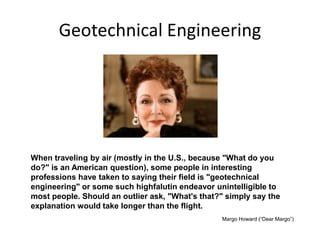The 10-Minute Rule for Geotheta
The 10-Minute Rule for Geotheta
Blog Article
The 5-Minute Rule for Geotheta
Table of ContentsGeotheta Can Be Fun For EveryoneGetting The Geotheta To WorkFascination About GeothetaGeotheta Things To Know Before You Get This
They team up with civil designers, structural designers, architects, and various other professionals to integrate geotechnical considerations right into the overall task layout and building process. This calls for reliable team effort, coordination, and interaction to make certain that the geotechnical aspects align with the task goals and meet regulatory demands.Mining & Materials Engineering: Principles of drilling, infiltration rates, and elements impacting the selection of drilling approach. Characteristics of nitroglycerins, shooting systems and blast patterns. Blasting methods in surface and underground workings. Special blowing up methods at excavation boundaries. Resonance and noise control. Mechanical and constant methods to fragmentation, including longwall shearing and fullface boring.
Modelling of piece and particle size circulations; comminution as a transfer function. Comminution innovation: crushing, grinding, dimension classification. Integrated analysis of fragmentation and comminution operations. Provided by: Mining & Materials Engineering.
More About Geotheta
Bachelor's degree programs in civil, geotechnical, geological, and ecological design commonly last four years and consist of basic education and learning programs in English, social scientific research, and the humanities, along with programs in sophisticated mathematics, structural geology, and fluid mineralogy. (https://www.merchantcircle.com/blogs/geotheta-miami-fl/2024/8/Why-Geotechnical-Engineers-at-Geotheta-Are-Your-Best-Bet/2781881)
Geotechnical design entails the assessment of the dirt and rock conditions at a specific website, and their effects for the advancement of that site. As the majority of frameworks rely on the ground for assistance, it is without surprise that a comprehensive understanding of the ground conditions, and the viability of foundation systems, are vital to the long-lasting security and performance of the structure or structure.
Being experts in the investigation of geological developments and ground behavior, geotechnical designers carry out scientific investigations and testing to comprehend the impact these geological formations may carry the layout and building and construction of building, civil and facilities tasks. This expertise is important for the style and building of structures, roads, tunnels, dams, bridges, and water supply and sewer systems.
The geotechnical group at Douglas Allies regularly seek advice from designers, layout engineers, programmers, and building contractors to make referrals on layout and growth propositions to make certain that the built structures are appropriately designed for the ground conditions. The design of footing systems requires to consider the weight of the structure, the capacity of the ground to support that weight together with activity resistances and efficient construction.
The Ultimate Guide To Geotheta
This job is significantly simplified by the use our Douglas Map geospatial platform which makes this details readily obtainable in an easy to make use of internet browser user interface. A geotechnical designer will direct the boring of boreholes and test pits to collect soil and other examples, and likewise evaluate surface functions and ground exposures to develop a geotechnical model of the subsurface problems.
Depending upon the project kind and ground conditions encountered, research laboratory screening may among other things evaluate strength, compressibility, reactivity and/or permeability of dirt and rock samples. Hereafter information is collected and looked at, the results are utilized for a geotechnical version of the site, which is generally presented as sections throughout the site.

A geotechnical investigation naturally can only evaluate the ground conditions at the places drilled or excavated. Natural variants in soil and rock conditions can take place throughout a website and in between examination places. It is for that reason excellent practice that the geotechnical designer be kept throughout construction of the project to give on-site confirmation that the ground problems come across follow the assumptions and recommendations provided in the geotechnical investigation report.
Geotheta Things To Know Before You Get This
Geotechnical engineers utilize their extensive expertise of dirt and rock to analyze danger and solve troubles on varied framework projectsGeotechnical design is a specialist branch of civil engineering which looks at the practices of planet materials and the application of dirt and rock mechanics. Geo Tech Engineer. As a geotechnical engineer, you will examine the physical, mechanical and chemical homes of dirt and rock in order to develop foundations, preserving frameworks and earthworks
Geotechnical engineering is very closely linked to and overlaps with, both design geology and ground engineering - https://soundcloud.com/geotheta. It's possible to be experts in geotechnics or job for a geotechnical company but be recognized as a design geologist or a ground designer. As a geotechnical engineer, you'll require to: develop and keep relationships with customers and other experts entailed in the site, throughout each projectmaintain safety and security requirements on site be conscious of cost implications when you make recommendationsstudy geological maps and aerial official site pictures from a variety of sources and from various time periodsexamine construction plans to see how possible they are based upon your understanding of the siteinvestigate dangers or geological risks for the sitesearch for eco sensitive features, such as garbage dump beginning to develop accurate and interpretive ground modelsplan field investigationsdrill and analyse samples of bedrock, dirt, groundwater and added products supervise other experts on sitesolve technical problems as they emerge, such as unexpected frameworks at drill sitesmonitor conditions throughout and after construction to make certain frameworks are stable in the brief and long termadding data accumulated on site to your preliminary researchcreating geotechnical estimations, illustrations, and two or three-dimensional computer system versions translating the datamaking suggestions about the suggested use of the site

Report this page